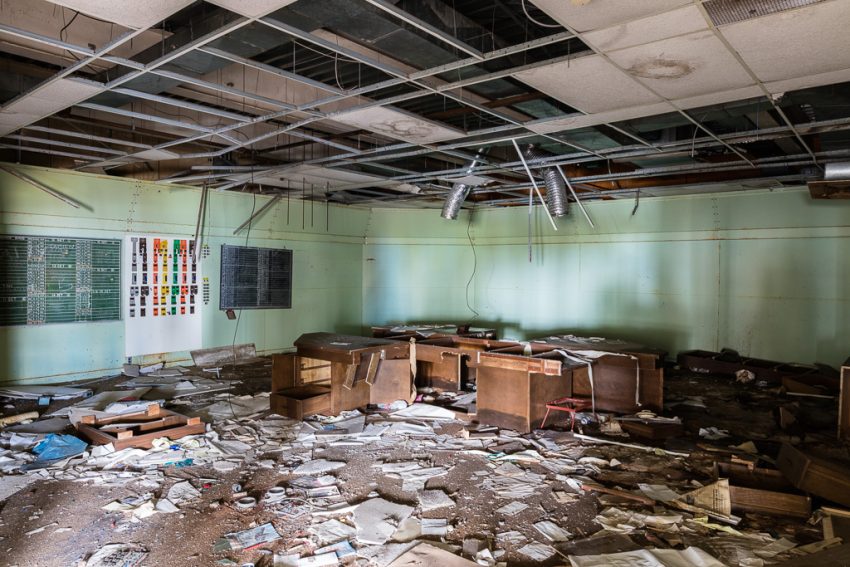A couple years after my dad completed an M.Ed. at Syracuse University, a colleague of his enrolled in the same program and, like my dad, uprooted his wife and children for the duration. I remember going to visit them over the winter holidays, driving past the jerry-built townhouses where we had lived, then on to the apartment building where they were staying. I can’t say exactly when this was, but I’d guess in or around 1970.
My dad’s friend took us on a tour of the building because there was something he wanted to show us. We got into the elevator and he pushed the button that took us to the very bottom of the building, to the sub-basement of sub-basements. When the doors opened, he led us down a corridor with cinder block walls. It was the coldest most inhospitable space I’d ever visited. He opened a door and held it for us as we filed inside. There were shelves stacked to the ceiling with black metal barrels which, he explained, were filled with water, and there were more shelves stacked to the ceiling with other supplies. It was a fallout shelter where tenants of the building could take cover in the event of a nuclear detonation. Nobody explained that to me at the time, maybe reasoning that young children shouldn’t have to worry about such things. However, I distinctly remember wondering what the water would taste like after it had sat for years in a metal container.
The world moved on from detente to glasnost to the collapse of the Soviet Union and the end of the Cold War. With the exception of extremists, most people gave up on bunkers and fallout shelters. I was too young for the “duck and cover” propaganda shorts at the height of the Cold War, the films which taught students to hide under their desks if the air raid siren sounded. In retrospect, it seems ludicrous to suggest that a flimsy school desk would provide any kind of protection against a nuclear attack. It seems more plausible to suggest that the purpose of these shorts was to teach children how to be afraid. Good children were afraid of Russians. More generally, communists. People who leaned to the left. People who spoke with an accent. I’m glad I was never exposed to that propaganda. I’m glad I never internalized the fear it was intended to generate. Fear is a potent drug and, like roofies, makes its victims highly suggestible in the hands of those who have more power.
In the last years of his life, my grandfather began to despair for the future and, although no professional ever made a diagnosis, I suspect he became clinically depressed. I wonder if this doesn’t happen to a lot of elderly people. In the late 80’s, he spent an inordinate amount of time watching bleak newscasts which tended to confirm his bleak worldview. I remember a family dinner when he shared his bleak worldview with everyone. Nodding to me and my brother, he declared in his tremulous and authoritative voice that, thanks to the proliferation of nuclear arms, it was unlikely his grandchildren would see the end of their natural lives. That was about the time when his prostate cancer metastasized into bone cancer. He knew the end was near and extrapolated from his own mortality: there is no more reason to suppose the human race should go on and on than there is to suppose a cancer-riddled man should go on and on. At the time, I waved aside his words as the ramblings of a man addressing his personal despair. Thirty-five years later, now vaguely aware that my own life has an expiry date, I can see that, at least in the broad strokes, my grandfather was right.
There is one respect in which my grandfather was absolutely wrong, and that is in the matter of fear. We have cause to fear. And we are allowed to feel fear. But the one thing we cannot do is allow our fear to determine outcomes. Vladimir Putin has instructed his defence minister and military chief of staff to “transfer the deterrence forces of the Russian army to a special mode of combat duty.” In other words, he is contemplating the use of nuclear devices in Russia’s invasion of Ukraine. Yes, we have cause to fear. At the same time, we have the example of Ukrainian President Volodymyr Zelenskiy. If ever there was a case of “right place, right time,” this is it. As a comedian, his vocation is to combat fear, and true to his vocation, he insists on facing his enemy and has rallied ordinary Ukrainians to join him. He will not allow fear to determine outcomes. We would do well to follow his cue.
